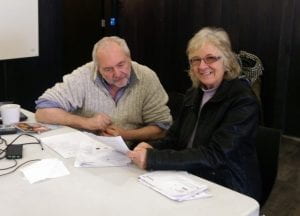Author: Colin Nolden, Vice-Chancellor’s Fellow, University of Bristol Law School
Energise Sussex Coast and South East London Community Energy are set to benefit from a new business collaboration led by Colin Nolden and supported by PhD students Peter Thomas and Daniela Rossade. This is funded by the Economic and Social Research Council with match funding provided by Community Energy South from SGN. In total, £80,000 has been made available from the Economic and Social Research Council Impact Accelerator Account to launch six new Accelerating Business Collaborations involving the Universities of Bath, Exeter and Bristol. This funding aims to increase capacity and capability of early career researchers and PhD students to collaborate with the private sector. Match funding from SGN (formerly Scotia Gas Network) provided by Community Energy South for this particular project will free up time and allow Energise Sussex Coast and South East London Community Energy to provide the necessary company data and co-develop appropriate data analysis and management methodologies.
The Capturing the value of community energy project evolved out of the Bristol Poverty Institute (BPI) interdisciplinary webinar on Energy and Fuel Poverty and Sustainable Solutions on 14 May 2020. At this event Colin highlighted the difficulty of establishing self-sustaining fuel-poverty alleviation business models, despite huge savings on energy bills and invaluable support for some of the most marginalised segments of society. Peter also presented his PhD project, which investigates the energy needs and priorities of refugee communities. With the help of Ruth Welters from Research and Enterprise Development and Lauren Winch from BPI, Colin built up his team and concretised his project for this successful grant application.
The two business collaborators Energise Sussex Coast (ESC) and South East London Community Energy (SELCE) are non-profit social enterprises that seek to act co-operatively to tackle the climate crisis and energy injustice through community owned renewable energy and energy savings schemes. Both have won multiple awards for their approach to energy generation, energy saving and fuel poverty alleviation.
However, both are also highly dependent on grants from energy companies such as SGN with complicated and highly variable reporting procedures. This business collaboration will involve the analysis of their company data (eight years for ESC, ten years for SELCE) to take stock of what fuel poverty advice and energy saving action works and what does not, and to grasp any multiplier effects associated with engaging in renewable energy trading activities alongside more charitable fuel poverty alleviation work.
Benefits for ESC and SELCE include the co-production of a database to help them establish what has and has not worked in the past, and where to target their efforts moving forward. This is particularly relevant in the context of future fuel-poverty alleviation funding bids. With a better understanding of what works, they will be able to write better bids and target their advice more effectively, thus improving the efficiency of the sector more broadly.
It will also help identify new value streams, such as those resulting from lower energy bills. Rather than creating dependents, this provides the foundation for business model innovation through consortium building and economies of scale where possible, while improving targeted face-to-face advice where necessary. It will also explore socially distant approaches where face-to-face advice and engagement is no longer possible.
With a better understanding how and where value is created, ESC and SLECE, together with other non-profit enterprises, can establish a platform cooperative while creating self-renewing databases which enable more targeted energy saving and fuel poverty advice in future. Such data also facilitates application for larger pots of money such as Horizon2020, and the establishment of a fuel poverty ecosystem in partnership with local authorities and other organisations capable of empowering people instead of creating dependents. This additional reporting will capture a wider range of value and codify it to be submitted as written evidence to the Cabinet Office and Treasury at national level, while also acting as a dynamic database for inclusive economy institutions and community energy organisations at regional and local level.
People
Dr Colin Nolden is a Vice-Chancellor’s Fellow based on the Law School, University of Bristol, researching sustainable energy governance at the intersection of demand, mobility, communities, and climate change. Alongside his appointment at the University of Bristol, Colin works as a Researcher at the Environmental Change Institute, University of Oxford. He is also a non-executive director of Community Energy South.
Peter Thomas is a University of Bristol Engineering PhD student investigating access to energy in humanitarian relief by combining insights from engineering, social sciences, and anthropology.
Daniela Rossade is a University of Bristol Engineering PhD student investigating the transition to renewable energy on the remote island of Saint Helena and the influence of renewable microgrids on electricity access and energy poverty.
Partner Companies
- Energise Sussex Coast Ltd http://www.energisesussexcoast.co.uk/
- South East London Community Energy Ltd https://selce.org.uk
- Community Energy South https://www.communityenergysouth.org
Contact
For more information on the project contact: Dr Colin Nolden colin.nolden@bristol.ac.uk


